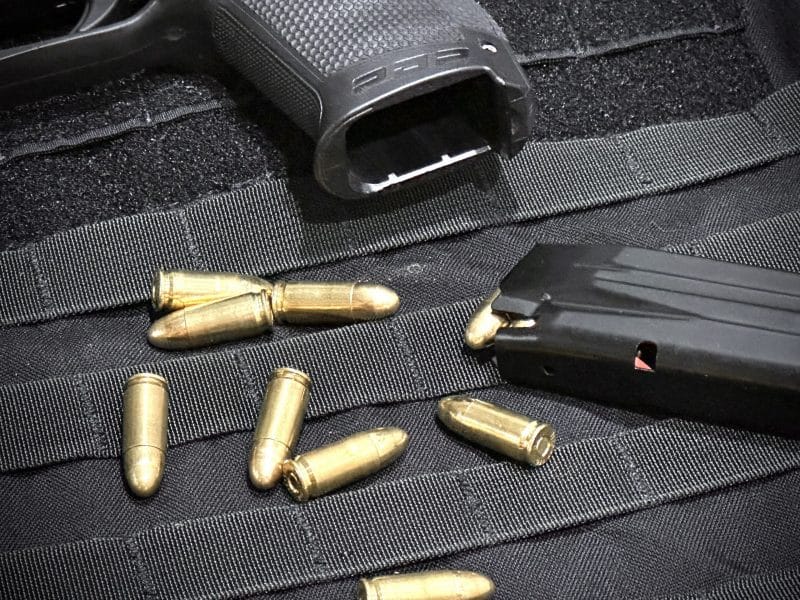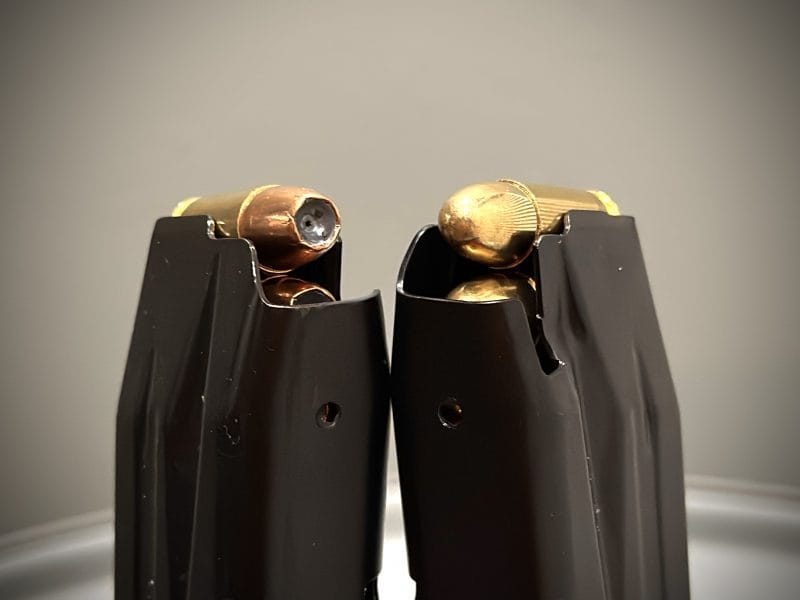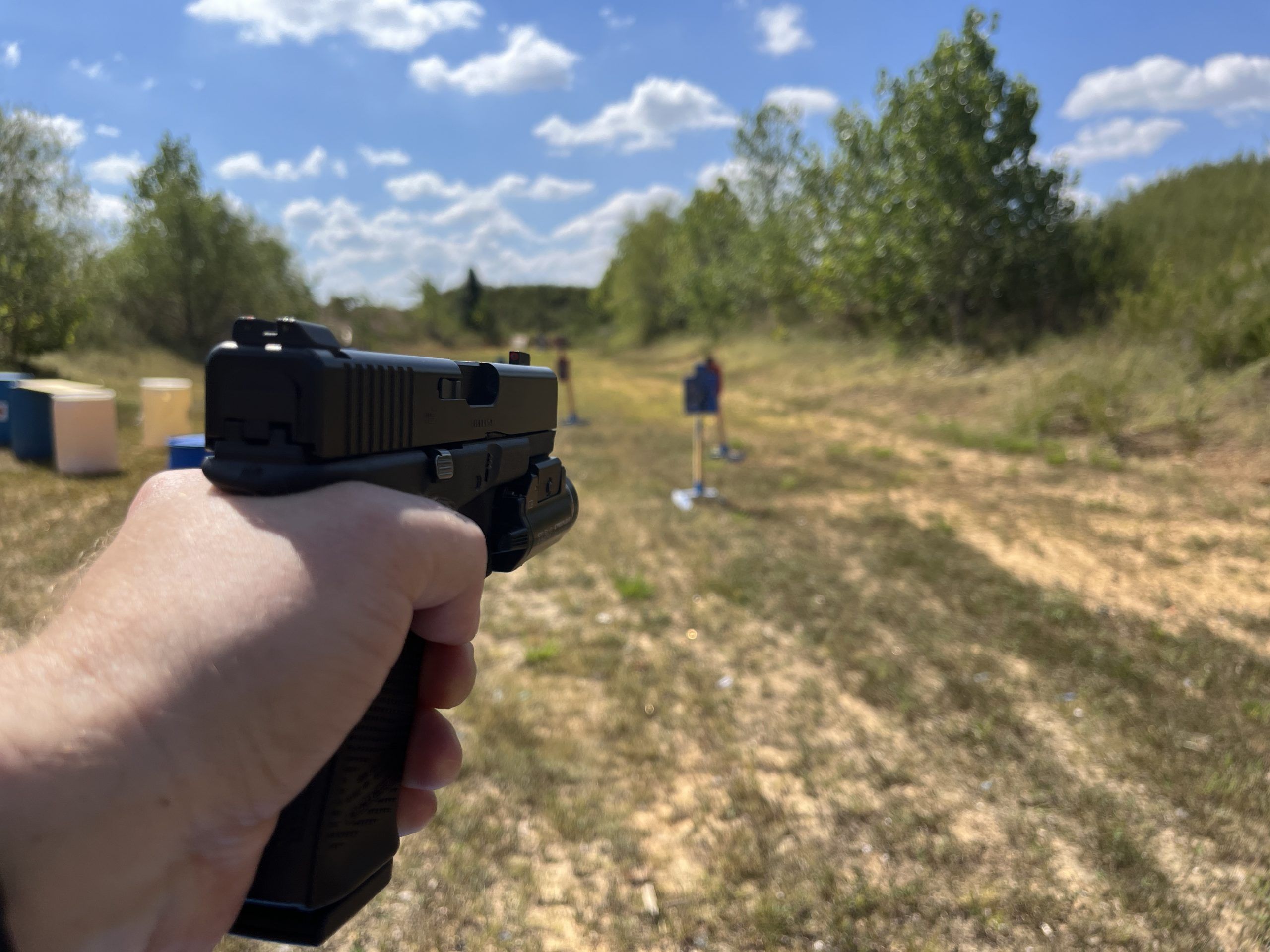The cheapest ammo to buy is full-metal jackets. When our department trains, we train with FMJ most of the time, and when I’m out plinking with the guys, we shoot FMJ ammo. But that is different than carrying FMJ for self-defense. The idea is to stop the attacker and not harm people behind the bad guy. One of the most popular calibers for defensive carry is 9mm, which is also one of the worst over-penetrating rounds to carry. Hollow point ammo has changed the game with this issue and allows someone to stop a threat while greatly reducing the danger of overpenetration.

Over-penetration is not the only downside to FMJ ammo for defense. When a bullet passes directly through the target at a high velocity, it reduces its stopping power. Once the bullet leaves the target, any energy the bullet carries with it was not used on the target. For this reason, larger rounds are slower but have more knock-down power at closer ranges. The trade-off is the heavier bullet also slows faster and cannot travel as far to reach a target. For handguns, the 9mm is a bullet that needs something to help it distribute its energy on first impact. The hollow point is not perfect, but it helps solve the problem.
Hollow Point vs Jacketed Hollow Point?
Bullets that expand on impact were being made by the late 1800s. There were several different designs until the hollow point bullet started being used at the turn of the century. As ammo advanced, jacketed hollow points were designed and have since become the most common self-defense bullet available. A standard hollow point bullet is what it sounds like: a bullet with a hollowed-out spot at the end of it. This helps slow the bullet down and, in some cases, break apart on impact.

A jacketed hollow point bullet not only has the hollowed-out spot at the end of the bullet but also a coating (or jacket) over the core of the bullet. When a jacketed hollow point (JHP) contacts a target, it helps the bullet expand into a mushroom shape. As the bullet expands, the wound is made larger, and the energy is absorbed by the target. How each JHP bullet is made will vary from one manufacturer to the other. A JHP will also feed better in most weapons because of the coating on the bullet.
The Liability of Carrying FMJ Ammo for Defense
A JHP is the best type of ammo for stopping a threat quickly. It’s made to stop on impact and not over-penetrate. In my job, we must explain everything we do in court. This explanation includes why we fired a weapon, why we chose that brand of ammo, that caliber, and so on. This is no different for anyone involved in a self-defense shooting. Basically, you need to be able to explain why you acted and why you carried the gun and ammo that were used. The type of gun and ammo you carry may feel insignificant and no one else’s business, but it will matter a lot during a criminal or civil trial.

If you are trying to explain to a jury why you were forced to use your weapon, they will want to see that you had no other choice. Carrying a weapon that has “born to kill” engraved on the side of it could cause issues with them believing you. Convincing the jury that you did everything in your power to be safe, even during a self-defense confrontation will be hard if a third party is injured by an FMJ you fired. What will you say when asked why you did not carry a bullet that was made for self-defense?
Is FMJ ammo only good for target practice?
Hollow-point ammo is the best of the best for self-defense rounds. It is accurate, shoots clean, and has more impact on the target than a full-metal jacket. But this does not mean FMJs are only good for target practice. I keep JHP ammo in my duty and off-duty weapons, but I also keep some mags with FMJ ammo for specific cases. Remember, different types of guns and ammo have different purposes. Most of the time, JHP ammo is going to be ideal, especially in public. It has stopping benefits, it’s safer, and it can be explained better in most self-defense cases.

There are some cases when FMJ ammo could be justified. In cases where an attacker is in a vehicle or behind some type of cover, an FMJ may be needed for better penetration. JHP ammo can also be difficult if you need to shoot through the windshield of a vehicle. Of course, in most situations, there would not be time to switch out ammo for this purpose. But you never know what circumstances could arise and it is better to be prepared and not need it.
In some cases, a bad guy wearing a lot of clothing can slow a hollow point down enough that it becomes less effective. Having a different mag to grab with better penetrating bullets may be needed. Surroundings and what you are shooting at will always be the deciding factor of what ammo is needed. Because things happen quickly, switching out ammo is not always possible, I like to carry hollow-point ammo as a default.
Summary
Most hollow-point ammo costs more than $1 per round. That can be expensive if you plan to carry multiple mags and do a little training too. I would not recommend carrying any type of ammo that you have not fired through the weapon first. FMJ ammo is much cheaper, so it works great for practice on the range. But I can’t stress enough the dangers of carrying FMJs for everyday carry. It’s a free country and you can carry whatever you prefer (at least for now) but if you want to minimize over-penetration while maximizing target impact, hollow-point ammo is the way to go.


